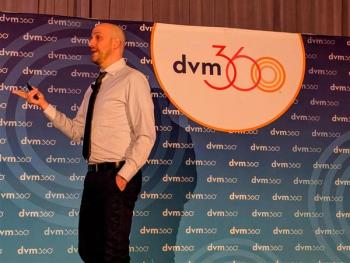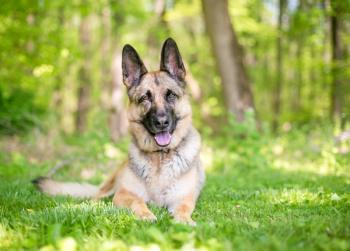
Veterinary help for an unwavering ally
CSU steps in when Chester, a therapy dog who provided care at the Colorado theater shooting trial, developed sudden, severe pain.
Friendly face. Chester and a team with Animals for Therapy provided dozens of hours of comfort during the recent Aurora, Colorado, theater shooting trial. (Photos courtesy of Colorado State University)
Experts in neurology, urgent care, imaging and anesthesiology collaborated at Colorado State University's Veterinary Teaching Hospital recently to diagnose and provide a treatment plan for Chester, a 9-year-old Labrador retriever suffering from extreme neck pain.
Diagnostic tests indicated that the beloved retriever, who provided comfort to survivors during the Aurora, Colorado, theater shooting trial this fall, had a spinal infection that might be treatable with antibiotics, likely allowing Chester to avoid surgery.
“Chester lives his life to serve people,” said veterinary student Emily Kirkpatrick, who spent hours with Chester and his family at the hospital. “It meant so much to us to help return him to his normal self, and that's really why I went into veterinary medicine.”
Chester's tale of hope
Chester was bred to be a hunting dog. But the Nelsons adopted him at age 2, and his loving disposition made it clear that Chester was cut out for therapy work. He underwent training and now interacts most often with patients recovering from traumatic brain and spinal cord injuries.
Chester and four other dogs with Animals for Therapy spent the equivalent of 17 work days at the Arapahoe County Justice Center to console shooting survivors and the family members of victims during the grueling trial, said Kateri and Dean Nelson, owners of the nonprofit based in Golden, Colorado. The trauma support team was present during every major event in the trial, including delivery of the verdict and formal sentencing of the assailant in late August.
“Before a person would testify, some of them would pet Chester. The person would testify and come back crying, and would cuddle up with Chester on the ground. The last day, we were right there in the hallway with the families when it was all over,” Kateri Nelson said.
Just five days after formal sentencing on Aug. 26, Chester developed terrible pain, “lying there and screaming,” Nelson said. Their veterinarian advised the couple that Chester could have a ruptured disk in his neck; they were referred to CSU's Veterinary Teaching Hospital for diagnostic tests and possible surgery.
Imaging key to diagnosis
On Sept. 10, Justin Mathis, DVM, DACVECC, performed a radiographic examination with help from student Justine Barone. “There was some narrowing of the intervertebral disk space at the cervical-thoracic junction, but this could have been an infection,” Mathis said. “Chester needed magnetic resonance imaging (MRI) to know for sure.”
Hi-tech help. Magnetic resonance imaging pointed to infection as the most likely cause of Chester's excruciating neck pain.
The procedure gave Kirkpatrick and Stephanie McGrath, DVM, DACVN, a veterinary neurosurgeon and assistant professor of neurology, an answer: The disk was not ruptured; it was infected and surrounded by inflamed muscles, the reason for Chester's pain.
McGrath suggested that Chester take antibiotics for a full year to ensure the cause of infection was eradicated.
The course ahead
The MRI results helped McGrath identify three possible causes for Chester's pain. Most likely, she explained, was discospondylitis. A less likely cause could be cancer or a foreign body, such as a grass awn (a sharp seed), that migrated to the spine, she said.
Irritated muscles, shown in the MRI, provided evidence for infection, the veterinarians said.
A surgical biopsy of the lesion in Chester's neck would be needed for further confirmation, but the Nelsons “felt like treating the dog with antibiotics to monitor for response was the next, most appropriate step,” McGrath said.
After a month of antibiotic treatment, Chester will return to CSU for a checkup. If Chester does not improve, the Nelsons plan to move forward with the biopsy.
“Chester is just a good ol' boy,” said Kateri Nelson, an animal trainer, adding that Chester will return to therapy work as he heals. “I want him to continue doing what he loves to do-helping people.”
Newsletter
From exam room tips to practice management insights, get trusted veterinary news delivered straight to your inbox—subscribe to dvm360.





